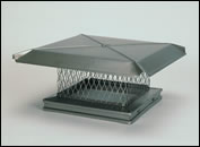 Your chimney is the perfect hiding spot for a variety of wildlife and domestic animals seeking shelter. Bad weather and predators often send them running for cover or warmth regardless of the potential dangers involved in their escape route. They don’t understand the possibility of becoming trapped, or breathing smoke, or being burned when you build a fire.
Your chimney is the perfect hiding spot for a variety of wildlife and domestic animals seeking shelter. Bad weather and predators often send them running for cover or warmth regardless of the potential dangers involved in their escape route. They don’t understand the possibility of becoming trapped, or breathing smoke, or being burned when you build a fire.
Always check your fireplace and chimney for debris and animals before you build your first fire of the season. Check for obstructions on a regular basis if you use your chimney a lot throughout the year. Call a professional chimney sweep if you discover something in your chimney or if you hear noises that could be a trapped animal in the chimney.
Remember – Any creature that can climb into the chimney, can end up inside your home. Here’s a quick story of just such an incident:
An acquaintance had just returned home from work. She saw a black tail flick around the corner that lead to the kitchen when she opened the door. She assumed it was her cat, but after some thought, she realized that the tail looked thicker than her cat’s tail. She walked into the kitchen just in time to see a raccoon jump onto the counter top. Luckily, she had a friend who worked for Fish and Wildlife, so she called him. They set up a trap, caught the raccoon, and released it in a safe area. She immediately requested that a chimney cap be installed to prevent potential uninvited guests in the future.
8 Types of Animals You May Find in the Chimney
The eight most common types animals found in chimneys include:
- Rats and Mice
- Squirrels
- Birds
- Bats
- Opossums
- Raccoons
- Cats
Several unsuspecting creatures like rats, mice, squirrels, and a variety of birds are usually simply looking for somewhere safe to build nests to raise their young. Unfortunately, your chimney isn’t the safe haven they need it to be. Please be vigilant and keep an eye out for these little guys.
Safety First
I understand that you probably don’t want to risk injuring a helpless animal in your chimney, but please remember that the animal is wild and likely very frightened. A hungry, frightened, possibly injured animal can be very dangerous. Don’t attempt to remove the animal on your own. Visit your local doctor or emergency room if you are bitten or otherwise injured by an animal trying to protect itself or its young.
Avoid Animals in the Chimney with These Tips
Small animals often seek shelter from the weather and protection against predators wherever they can find it; sometimes this means in your chimney. I’ve seen several incidents of animals in the chimney. Most are dealt with before tragedy strikes, but there have also been many animal casualties. The most effective ways to keep animals out of your chimney include:
- Regular inspections
- Visual inspection before building a fire
- Install a chimney cap
A quick look can save an animal’s life and save your home from backed up smoke and the horrible burning smell of a deceased animal in the chimney. A chimney cap covers the top of the chimney in a way that prevents animals from being able to enter. This will help keep animals out of your chimney, and out of your home.
